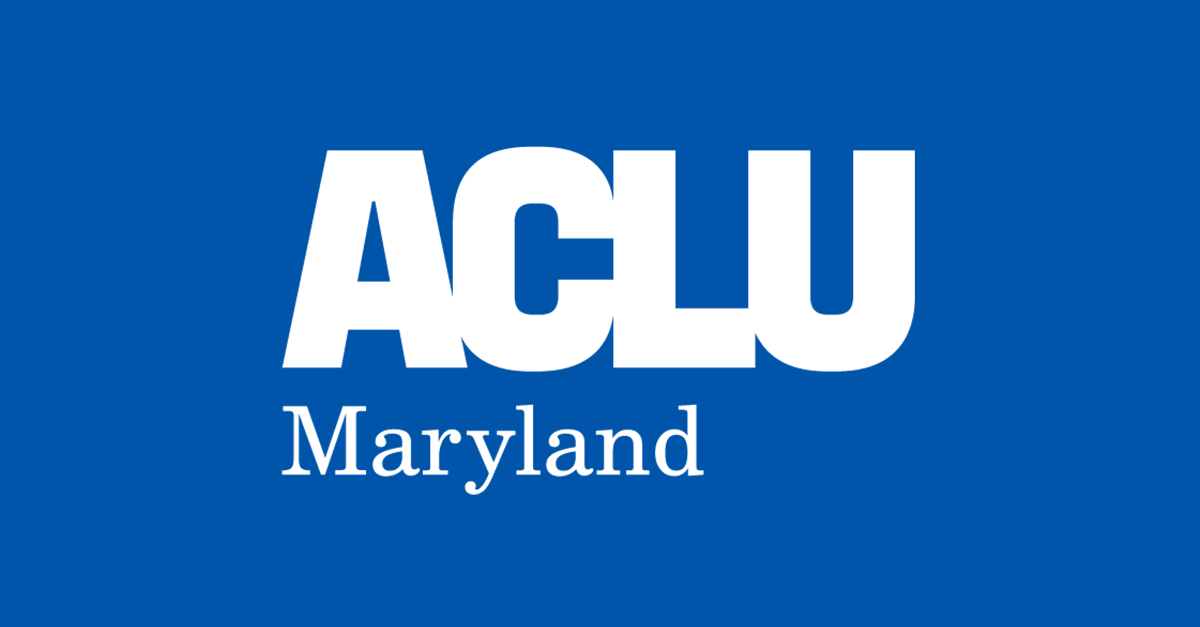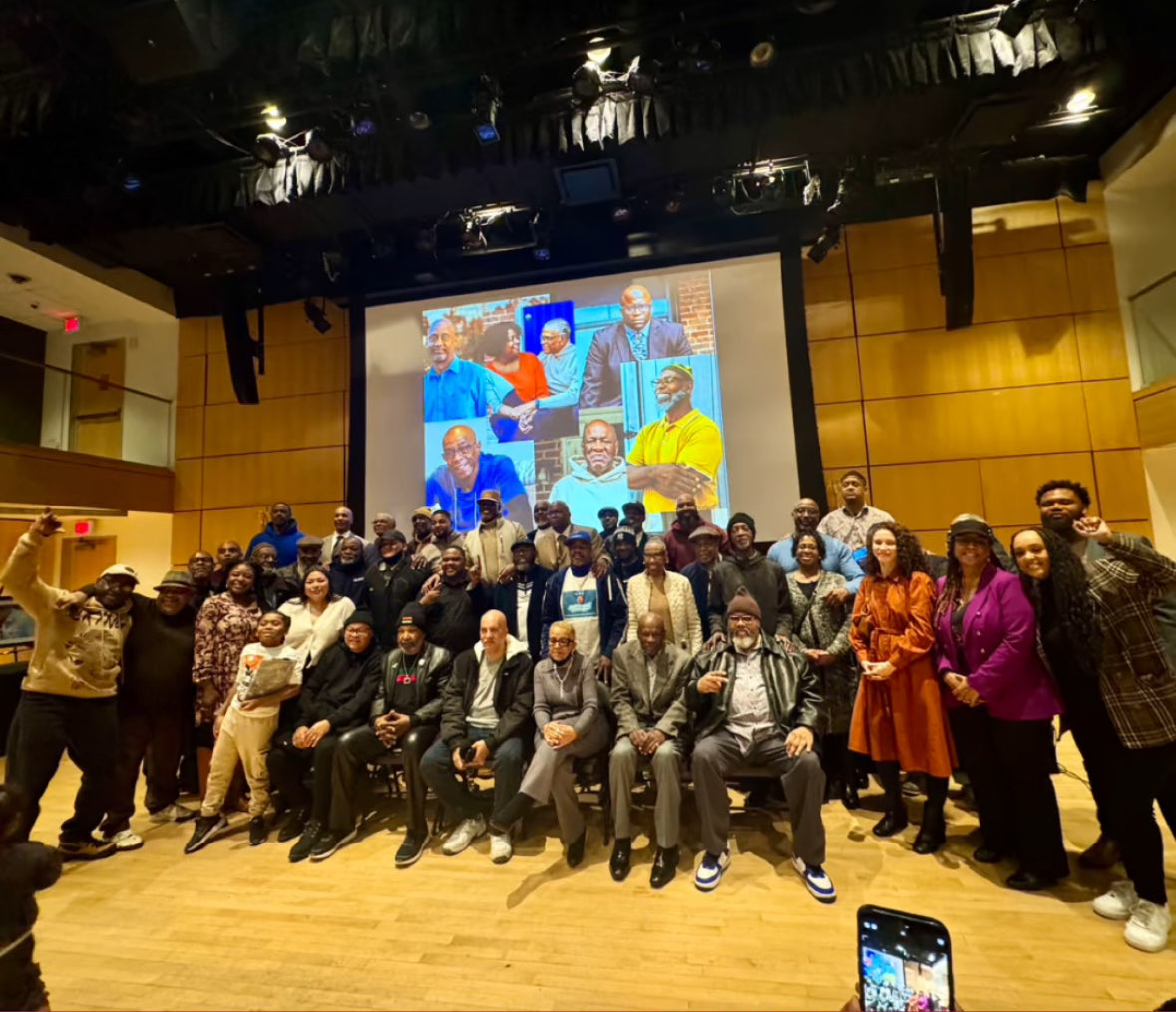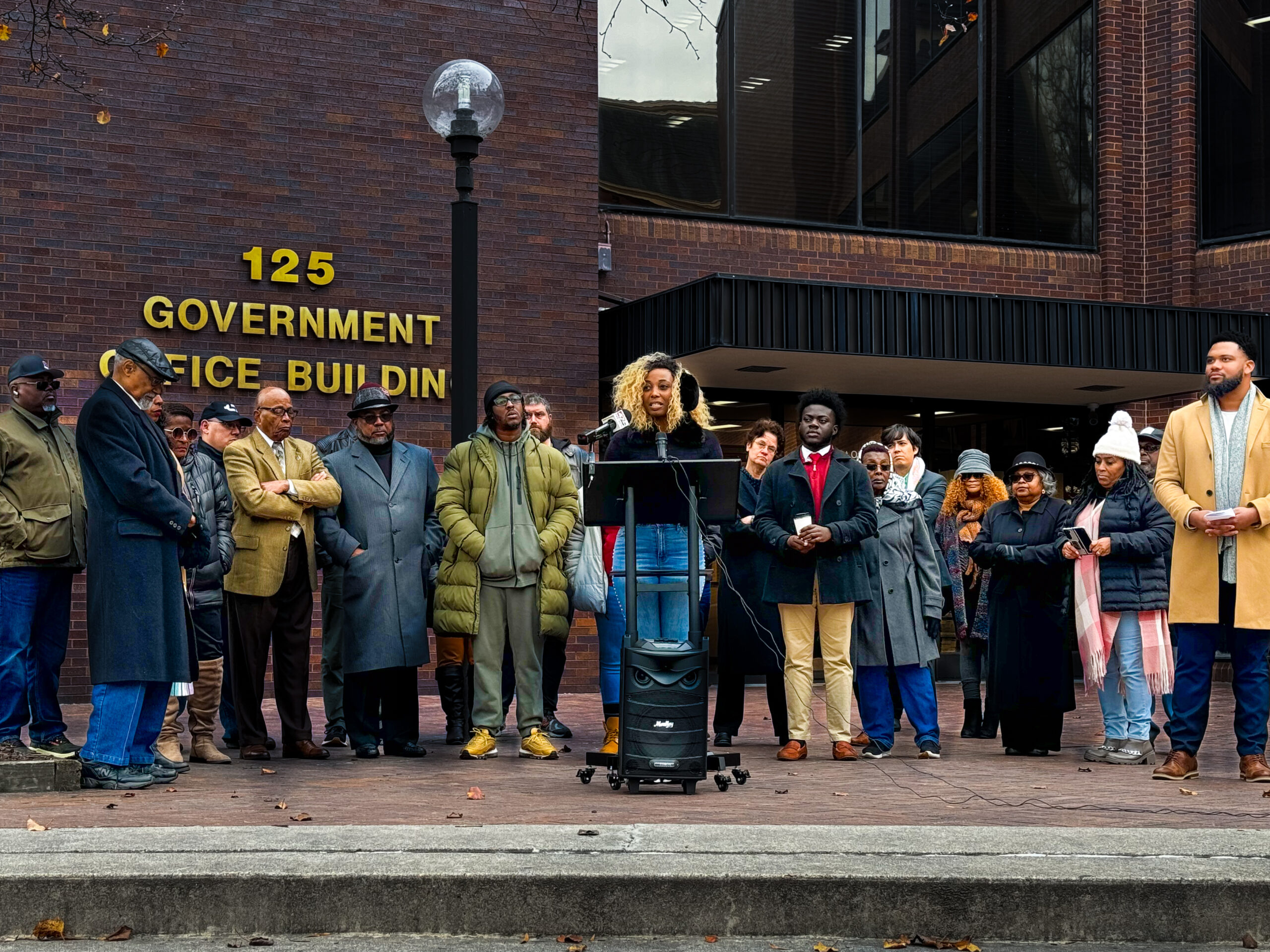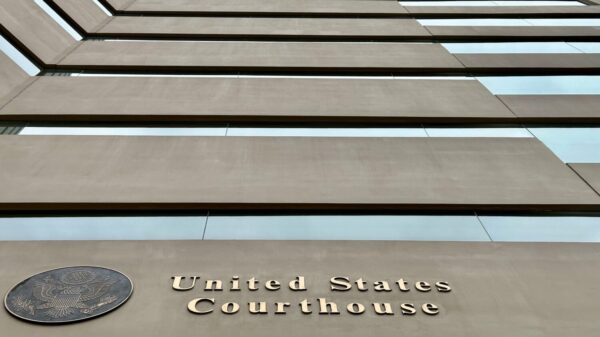Summer 2025 issue of Free State Liberties, the newsletter by the American Civil Liberties Union of Maryland and the American Civil Liberties Union Foundation of Maryland.
Want to support our work and receive the newsletter in the mail? Become a member-donor today.
(Newsletter Editor/Designer: Nehemiah Bester, Writer: Tiffany Turner
Summer 2025: Highlights
"Any administration that seeks to remove constitutional rights and freedoms from you, will have to go through us."
Dear Friends of Civil Liberties
Executive Letter
Dear Friends of Civil Liberties,
In times of challenge, our collective commitment to justice becomes even more vital.
Just months into this new administration, we’ve seen more than 40 Executive Orders targeting the rights of immigrants, LGBTQ+ people, schools, and children—with no regard for constitutional protections or respect for the democratic process. Have no doubt – the ACLU is prepared for this moment!
With your support, we’ve taken over 110 legal actions against the administration. Within hours of Trump’s inauguration, we filed our first case, challenging his effort to dismantle the Fourteenth Amendment’s guarantee of birthright citizenship. We won multiple orders blocking Trump’s invocation of the 1798 Alien Enemies Act, defended immigrants targeted for detention and deportation and protected the First Amendment free speech of students in school and on college campuses.
We are grounded in racial justice and guided by our belief in the dignity of every person. We are fighting these dangerous orders in court, in our communities, in coalition – and we will not back down.
This moment demands more than resistance. It calls for imagination, care, and resolve. We will defend police accountability, uphold immigrant rights, challenge discriminatory election systems, protect the rights of the incarcerated, and ensure that the voices of the marginalized are heard and respected. You’ll find highlights of that work in the stories and updates throughout this newsletter.
From the start, this administration has tested the limits of our democracy—but the ACLU didn’t flinch. No matter who is in office, we will continue to hold the line. Any administration that seeks to remove constitutional rights and freedoms from you, will have to go through us.
Thank you for being with us. Your commitment makes this work possible. With gratitude and solidarity,
Dana Vickers Shelley
Executive Director, ACLU of Maryland
Corey Stottlemyer
Board President, ACLU of Maryland

Dear Friends of Civil Liberties,
In times of challenge, our collective commitment to justice becomes even more vital.
Just months into this new administration, we’ve seen more than 40 Executive Orders targeting the rights of immigrants, LGBTQ+ people, schools, and children—with no regard for constitutional protections or respect for the democratic process. Have no doubt – the ACLU is prepared for this moment!
With your support, we’ve taken over 110 legal actions against the administration. Within hours of Trump’s inauguration, we filed our first case, challenging his effort to dismantle the Fourteenth Amendment’s guarantee of birthright citizenship. We won multiple orders blocking Trump’s invocation of the 1798 Alien Enemies Act, defended immigrants targeted for detention and deportation and protected the First Amendment free speech of students in school and on college campuses.
We are grounded in racial justice and guided by our belief in the dignity of every person. We are fighting these dangerous orders in court, in our communities, in coalition – and we will not back down.
This moment demands more than resistance. It calls for imagination, care, and resolve. We will defend police accountability, uphold immigrant rights, challenge discriminatory election systems, protect the rights of the incarcerated, and ensure that the voices of the marginalized are heard and respected. You’ll find highlights of that work in the stories and updates throughout this newsletter.
From the start, this administration has tested the limits of our democracy—but the ACLU didn’t flinch. No matter who is in office, we will continue to hold the line. Any administration that seeks to remove constitutional rights and freedoms from you, will have to go through us.
Thank you for being with us. Your commitment makes this work possible. With gratitude and solidarity,
Dana Vickers Shelley
Executive Director, ACLU of Maryland
Corey Stottlemyer
Board President, ACLU of Maryland
Legislative Updates
Policy Wins
Language Access
Expanding Language Access for Maryland Voters
As part of the landmark Maryland Voting Rights Act, we worked with advocacy partners to win new language access requirements that ensure more voters can understand the voting process. The new provisions expand on existing federal laws requiring translation of election materials, lowering the population threshold required for coverage and increasing the number of languages covered. These changes ensure that election materials are more accessible for historically excluded communities and are part of a broader package of protections designed to defend and expand voting rights statewide.
Sensitive Locations Act
Keeping ICE Out of Schools, Hospitals and Other Safe Spaces
After the federal government rolled back longstanding protections against immigration enforcement in spaces like schools, hospitals, courthouses, and places of worship, we joined immigrant rights advocates on emergency legislation to stop ICE from targeting Marylanders. The Protecting Sensitive Locations Act requires the Attorney General (AG) to develop policy guidelines for locations that provide essential state-funded services to the public and prohibits federal immigration law enforcement from entering the location unless it presents a valid warrant issued by a federal or state court. Sensitive locations named in the legislation include public schools, public libraries, courthouses, facilities operated by the Comptroller, state-funded healthcare and mental health facilities, shelter care, and other locations determined by the AG.
Medical Parole Fix
Fixing Medical Parole to Protect Human Dignity
When lawmakers removed the Governor from life-sentence parole decisions in 2021, they accidentally left out medical parole—trapping seriously ill people in a dangerous and unnecessary delay. For four years, we’ve advocated for a critical fix so that people with terminal illnesses aren’t forced to die behind bars while waiting six months for the Governor to act. This legislative session, lawmakers passed SB 181/ HB 1123, making the Parole Commission the final decision-maker for all parole cases.
Second Look Act
Fairer Sentencing Starts with Reevaluating Extreme Punishment
Thanks to the powerful advocacy of formerly incarcerated people and their families—alongside our support and that of community partners—the Maryland Second Look Act is now law. It allows certain people who committed crimes between the ages of 18 and 25 and have served at least 20 years of an extreme sentence to petition the court for resentencing. In a state with some of the worst racial disparities in incarceration, this law offers a path to redemption and healing by giving judges the chance to recognize growth, accountability, and readiness to return home.

Language Access
Expanding Language Access for Maryland Voters
As part of the landmark Maryland Voting Rights Act, we worked with advocacy partners to win new language access requirements that ensure more voters can understand the voting process. The new provisions expand on existing federal laws requiring translation of election materials, lowering the population threshold required for coverage and increasing the number of languages covered. These changes ensure that election materials are more accessible for historically excluded communities and are part of a broader package of protections designed to defend and expand voting rights statewide.
Sensitive Locations Act
Keeping ICE Out of Schools, Hospitals and Other Safe Spaces
After the federal government rolled back longstanding protections against immigration enforcement in spaces like schools, hospitals, courthouses, and places of worship, we joined immigrant rights advocates on emergency legislation to stop ICE from targeting Marylanders. The Protecting Sensitive Locations Act requires the Attorney General (AG) to develop policy guidelines for locations that provide essential state-funded services to the public and prohibits federal immigration law enforcement from entering the location unless it presents a valid warrant issued by a federal or state court. Sensitive locations named in the legislation include public schools, public libraries, courthouses, facilities operated by the Comptroller, state-funded healthcare and mental health facilities, shelter care, and other locations determined by the AG.
Medical Parole Fix
Fixing Medical Parole to Protect Human Dignity
When lawmakers removed the Governor from life-sentence parole decisions in 2021, they accidentally left out medical parole—trapping seriously ill people in a dangerous and unnecessary delay. For four years, we’ve advocated for a critical fix so that people with terminal illnesses aren’t forced to die behind bars while waiting six months for the Governor to act. This legislative session, lawmakers passed SB 181/ HB 1123, making the Parole Commission the final decision-maker for all parole cases.
Second Look Act
Fairer Sentencing Starts with Reevaluating Extreme Punishment
Thanks to the powerful advocacy of formerly incarcerated people and their families—alongside our support and that of community partners—the Maryland Second Look Act is now law. It allows certain people who committed crimes between the ages of 18 and 25 and have served at least 20 years of an extreme sentence to petition the court for resentencing. In a state with some of the worst racial disparities in incarceration, this law offers a path to redemption and healing by giving judges the chance to recognize growth, accountability, and readiness to return home.
Legal Briefs
Legal Updates
PFLAG Gender Affirming Care Win
Protecting Trans Youth and Gender-Affirming Care
In a victory for transgender people and their families nationwide, a U.S. District Court in Maryland blocked a discriminatory executive order that sought to block gender-affirming care for minors. Before a courtroom packed with supporters of LGBTQ+ rights, Judge Brendan Hurson rejected arguments made by the Department of Justice and ruled that the cutting off medically necessary care would cause irreparable harm to young trans people. The court issued a nationwide injunction to stop the order. That ruling will remain in effect as the case moves to the United States Court of Appeals for the Fourth Circuit.
DEI Restrictions
Defending Diversity, Equity, and Inclusion
The ACLU of Maryland is pushing back against efforts to ban diversity, equity and inclusion programs in schools and workplaces—a key tenet of the Trump Administration’s agenda. In amicus briefs and court filings across the country and here in Maryland, we have argued that these anti-DEI restrictions violate due process, the First Amendment, and federal funding laws. Our efforts are gaining traction: federal judges in Maryland and other states have temporarily blocked anti-DEI requirements, recognizing that Trump Administration efforts to silence speech or defund schools and institutions that promote inclusion are unconstitutional.
Immigrants’ Rights Organizing/Advocacy
Challenging Dangerous Immigration Policies
People born in the United States are American citizens by right, as guaranteed by the Fourteenth Amendment to the U.S. Constitution. We’re organizing alongside our partners to defend birthright citizenship and protect Maryland’s immigrant communities from racist and dangerous immigration policies. That includes fighting against programs like 287(g) that encourage racial profiling and challenging efforts to detain and deport people who have every right to be here. No matter who is in office, we’re committed to ending inhumane detention practices, protecting the dignity and rights of immigrants across our state, and guarding against the illegal removal and deportation of American citizens.

PFLAG Gender Affirming Care Win
Protecting Trans Youth and Gender-Affirming Care
In a victory for transgender people and their families nationwide, a U.S. District Court in Maryland blocked a discriminatory executive order that sought to block gender-affirming care for minors. Before a courtroom packed with supporters of LGBTQ+ rights, Judge Brendan Hurson rejected arguments made by the Department of Justice and ruled that the cutting off medically necessary care would cause irreparable harm to young trans people. The court issued a nationwide injunction to stop the order. That ruling will remain in effect as the case moves to the United States Court of Appeals for the Fourth Circuit.
DEI Restrictions
Defending Diversity, Equity, and Inclusion
The ACLU of Maryland is pushing back against efforts to ban diversity, equity and inclusion programs in schools and workplaces—a key tenet of the Trump Administration’s agenda. In amicus briefs and court filings across the country and here in Maryland, we have argued that these anti-DEI restrictions violate due process, the First Amendment, and federal funding laws. Our efforts are gaining traction: federal judges in Maryland and other states have temporarily blocked anti-DEI requirements, recognizing that Trump Administration efforts to silence speech or defund schools and institutions that promote inclusion are unconstitutional.
Immigrants’ Rights Organizing/Advocacy
Challenging Dangerous Immigration Policies
People born in the United States are American citizens by right, as guaranteed by the Fourteenth Amendment to the U.S. Constitution. We’re organizing alongside our partners to defend birthright citizenship and protect Maryland’s immigrant communities from racist and dangerous immigration policies. That includes fighting against programs like 287(g) that encourage racial profiling and challenging efforts to detain and deport people who have every right to be here. No matter who is in office, we’re committed to ending inhumane detention practices, protecting the dignity and rights of immigrants across our state, and guarding against the illegal removal and deportation of American citizens.
A Landmark Win for Voting Rights in Wicomico
Cover Story
After decades of hard-fought advocacy by Black Wicomico County residents, a United States District Judge this year ordered overhaul of the election system for the Wicomico County Council and its School Board to overcome historic discrimination and advance equal opportunities for Black voters. The Black residents of Wicomico have long had their votes diluted and their representation denied due to the partial at-large election system that led to decades of racial discrimination and oppression in their community. That ends now.
This landmark victory was made possible by the efforts of Black residents, including Monica Brooks, Dr. Eddie Boyd, Amber Green, Luc Angelot, Mary Ashanti, as well as organizing from the Wicomico County NAACP, the Caucus of African American Leaders, and the Watchmen with One Voice Ministerial Alliance.
The Court’s ruling resolves the Plaintiffs’ 2023 federal Voting Rights Act lawsuit by replacing the County’s discriminatory at-large election feature with seven single-member districts, including two districts that are majority Black in voting age population. But unlike traditional voting rights settlements, this settlement goes much further by building in creative additional remedies to help rectify past harms against the Black community, promote community unity, and elect a more inclusive and collaborative local government. These include establishment of a new Wicomico Human Rights Advisory Committee, adding a first-ever permanent student member position on the School Board, mandating anti-bias training, and creating biannual special work sessions with the plaintiff organizations in conjunction with the election reforms.
When asked what this victory means, individual plaintiff in the case and longtime advocate from Wicomico County Amber Green, said this, “This victory belongs to the people. It is a testament to the power of collective action and a reminder that when we fight for justice, we win.”

After decades of hard-fought advocacy by Black Wicomico County residents, a United States District Judge this year ordered overhaul of the election system for the Wicomico County Council and its School Board to overcome historic discrimination and advance equal opportunities for Black voters. The Black residents of Wicomico have long had their votes diluted and their representation denied due to the partial at-large election system that led to decades of racial discrimination and oppression in their community. That ends now.
This landmark victory was made possible by the efforts of Black residents, including Monica Brooks, Dr. Eddie Boyd, Amber Green, Luc Angelot, Mary Ashanti, as well as organizing from the Wicomico County NAACP, the Caucus of African American Leaders, and the Watchmen with One Voice Ministerial Alliance.
The Court’s ruling resolves the Plaintiffs’ 2023 federal Voting Rights Act lawsuit by replacing the County’s discriminatory at-large election feature with seven single-member districts, including two districts that are majority Black in voting age population. But unlike traditional voting rights settlements, this settlement goes much further by building in creative additional remedies to help rectify past harms against the Black community, promote community unity, and elect a more inclusive and collaborative local government. These include establishment of a new Wicomico Human Rights Advisory Committee, adding a first-ever permanent student member position on the School Board, mandating anti-bias training, and creating biannual special work sessions with the plaintiff organizations in conjunction with the election reforms.
When asked what this victory means, individual plaintiff in the case and longtime advocate from Wicomico County Amber Green, said this, “This victory belongs to the people. It is a testament to the power of collective action and a reminder that when we fight for justice, we win.”
Related Publications
Free State Liberties - Winter 2024
Stay Informed
Sign up to be the first to hear about how to take action.
By completing this form, I agree to receive occasional emails per the terms of the ACLU’s privacy statement.
By completing this form, I agree to receive occasional emails per the terms of the ACLU’s privacy statement.


